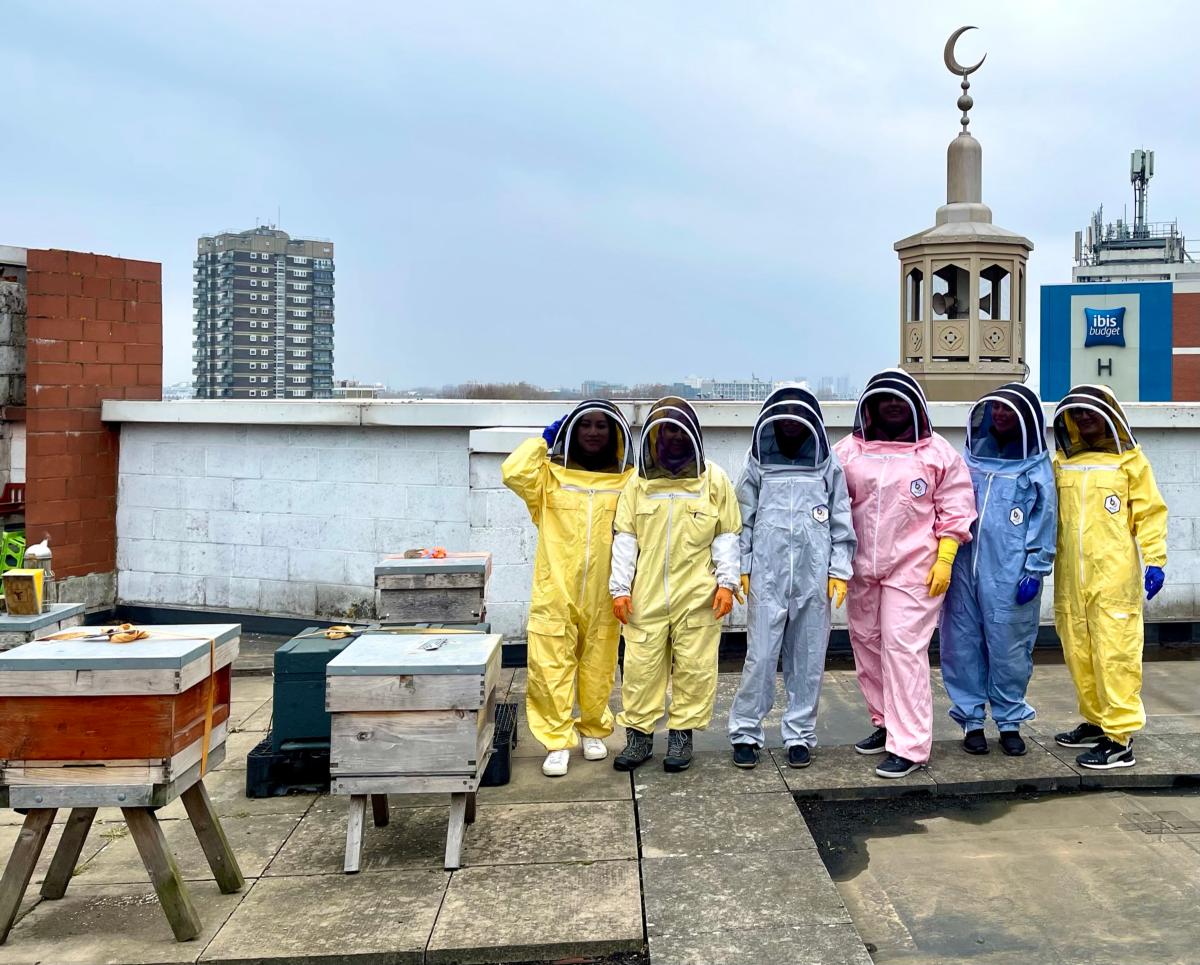Creating a buzz at the East London Mosque

To mark Earth Day this Friday 22nd April and Ramadan, colleagues from the Barts Dental Hospital headed up to the roof of East London Mosque in Whitechapel where they met Salma Attan, a local beekeeper who has created a buzz in this unexpected location.
We spoke to Salma about beekeeping, and why bees are so important for the environment and local community.
How did you get into beekeeping?
 It all started over 10 years ago when my husband’s hayfever was really bad and nothing was working for him anymore, so we thought to try local honey. We then saw an advert in the newspaper for a weekend taster course on beekeeping and both booked in. It was fascinating and we went onto doing a full course that we really enjoyed. We look after the bees here at the mosque as a family.
It all started over 10 years ago when my husband’s hayfever was really bad and nothing was working for him anymore, so we thought to try local honey. We then saw an advert in the newspaper for a weekend taster course on beekeeping and both booked in. It was fascinating and we went onto doing a full course that we really enjoyed. We look after the bees here at the mosque as a family.
Why are bees so important?
The bees provide a pollination service in every aspect of the ecosystem. Having the hives here means that they can support the growth of trees, flowers, and other plants in the area as well as raising awareness of environmental issues.
What made you decide to bring the hives to the East London Mosque?
The mosque is a pillar of our community and we thought it would be a great opportunity to raise awareness of environmental issues as well as become more connected to nature.
When we wrote to the council and the mosque, they were both really positive about the idea. Today, it’s become a great talking point for locals and it gets everyone thinking about our wider responsibility in terms of what we should be doing to look after the environment.
We had no intention of having this many hives, maybe just one in the garden. That was back in 2011, and now we have seven colonies here on the roof of East London Mosque! A colony of bees has around 10,000-60,000 worker bees and one queen dependant on the time of year.
The honey is used for mosque fundraising events and donated to VIP visitors.
But it’s worth noting that bees produce quite a few different products, not just honey. Munir Ravalia, who is a dentist and also a beekeeper explains:
“Bees also make propolis, which is a resin-like mixture that is used as a sealant for unwanted open spaces in the hive. It is also used by the bees as a medicine as it is naturally has high antifungal, antibacterial and antiviral properties. Propolis has been widely tested in human studies and is known to have medicinal qualities and can be used to treat all sorts of illnesses.”
Where can I learn more?
Now we host experience days for all sorts of groups and we’ve got courses running for anyone who wants to get into beekeeping.
Sinead, one of the Barts Health Dental nurses on the visit was particularly moved by the experience and now intends to book onto a course.
 Afrikaans
Afrikaans Albanian
Albanian Amharic
Amharic Arabic
Arabic Armenian
Armenian Azerbaijani
Azerbaijani Basque
Basque Belarusian
Belarusian Bengali
Bengali Bosnian
Bosnian Bulgarian
Bulgarian Catalan
Catalan Cebuano
Cebuano Chichewa
Chichewa Chinese (Simplified)
Chinese (Simplified) Chinese (Traditional)
Chinese (Traditional) Corsican
Corsican Croatian
Croatian Czech
Czech Danish
Danish Dutch
Dutch English
English Esperanto
Esperanto Estonian
Estonian Filipino
Filipino Finnish
Finnish French
French Frisian
Frisian Galician
Galician Georgian
Georgian German
German Greek
Greek Gujarati
Gujarati Haitian Creole
Haitian Creole Hausa
Hausa Hawaiian
Hawaiian Hebrew
Hebrew Hindi
Hindi Hmong
Hmong Hungarian
Hungarian Icelandic
Icelandic Igbo
Igbo Indonesian
Indonesian Irish
Irish Italian
Italian Japanese
Japanese Javanese
Javanese Kannada
Kannada Kazakh
Kazakh Khmer
Khmer Korean
Korean Kurdish (Kurmanji)
Kurdish (Kurmanji) Kyrgyz
Kyrgyz Lao
Lao Latin
Latin Latvian
Latvian Lithuanian
Lithuanian Luxembourgish
Luxembourgish Macedonian
Macedonian Malagasy
Malagasy Malay
Malay Malayalam
Malayalam Maltese
Maltese Maori
Maori Marathi
Marathi Mongolian
Mongolian Myanmar (Burmese)
Myanmar (Burmese) Nepali
Nepali Norwegian
Norwegian Pashto
Pashto Persian
Persian Polish
Polish Portuguese
Portuguese Punjabi
Punjabi Romanian
Romanian Russian
Russian Samoan
Samoan Scottish Gaelic
Scottish Gaelic Serbian
Serbian Sesotho
Sesotho Shona
Shona Sindhi
Sindhi Sinhala
Sinhala Slovak
Slovak Slovenian
Slovenian Somali
Somali Spanish
Spanish Sundanese
Sundanese Swahili
Swahili Swedish
Swedish Tajik
Tajik Tamil
Tamil Telugu
Telugu Thai
Thai Turkish
Turkish Ukrainian
Ukrainian Urdu
Urdu Uzbek
Uzbek Vietnamese
Vietnamese Welsh
Welsh Xhosa
Xhosa Yiddish
Yiddish Yoruba
Yoruba Zulu
Zulu